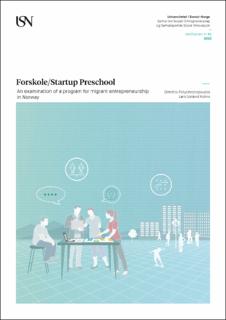Forskole/Startup Preschool. An examination of a program for migrant entrepreneurship in Norway
Report
Published version
Permanent lenke
https://hdl.handle.net/11250/2994401Utgivelsesdato
2022Metadata
Vis full innførselSamlinger
Sammendrag
This report is a study of a particular program under the auspices of Startup Migrants AS, called Forskole/Startup Preschool. The name difference reflects in which language the event is conducted. The study is limited to a data collection from the Forskole/Startup Preschool participants through Nettskjema, supplemented by direct observation from several Forskole/Startup Preschool-sessions.
The report is to answer the following research questions:
1. What is the most important hindrance for migrant entrepreneurs in obtaining their first customer?
2. To what extent does the Norwegian environment hinder the formation of new business for those with a non-western background?
3. What is the effect of public support programs, such as Norsk Arbeids- og velferdsetaten (NAV) on the participant’s ability to start a business?
The report is based on the researcher’s presence at six different Forskole/Startup Preschool between September 2021 and February 2022. Five of them in Oslo and the Oslofjord-region, one in Bergen, including survey responses from 32 participants in a survey via Nettskjema. The median response for this took four minutes and 45 seconds to complete.
Based on the outcome of the research activity conducted, the apparent answers to the above research questions are as follows:
1. Understanding the rules and bureaucracy and getting through it, is noted as the number one reported difficulty for migrant entrepreneurs in starting a business in Norway. It is of merit to share that it appears to be statistical significance for those without co-founders or team members, in citing the main difficulty as finding good advisors (rather than sorting out the rules and bureaucracy). Most of the Forskole/Startup Preschool participants, had not established a company yet. 27 of 32 respondents (more than 84%) had not registered a company, and were therefore not yet eligible to have paying customers.
2. As a migrant’s length of time in Norway increases, so does the likelihood the individual will be satisfied with the Norwegian system with regards to establishing a business. There is no evidence from the results that those with a non-western background are facing an extra hindrance in this area. It is rather a more important factor in whether a migrant entrepreneur is satisfied with the support received from the Norwegian system, how long they have been living in in Norway. Those who have spent less time in Norway are more likely to be dissatisfied by the support they receive from Norwegian support systems.
3. There is no evidence of an effect from NAV on migrant entrepreneurs’ abilities to start a business. Of the 32 respondents, only one was receiving money from NAV to attend Forskole/Startup Preschool. The satisfaction levels with the Norwegian support system for starting a business are relatively high, with nearly 50% of the participants expressing satisfaction and fewer than 25% expressing dissatisfaction.
Further details regarding the research and other insights gathered from the research appear in the text below.
Regarding the research question of hindrance for migrant entrepreneurs in Norway, we have followed this up by this research question: What can Forskole/Startup Preschool do to improve so that participants can increase their chances at acquiring their first customers?
The research shows that 29 of 32 respondents (more than 90%) for a long time have wanted to establish their own company. When combining this with the evidence that most of the participants still have not established any company, it would probably make sense to have a follow-up Forskole/Startup Preschool for those who complete the three-day weekend course to offer a customer-development workshop. While customer development is covered in the Forskole/Startup Preschool course to some extent, the timing seems not perfect for this item, for most participants. They may find themselves overwhelmed by the intensity of the three-day course and unable to follow up easily on the customer development issues after having established their business. As it happens, the researcher came across some of the previous Forskole/Startup Preschool participants in contexts of more extensive entrepreneurship training programs that last six to eight weeks, and we registered what is commented above as one of the things mentioned by this previous Forskole/Startup Preschool participants. Another possibility for Forskole/Startup Preschool could be to tie closer into the ecosystem and recommend alumni to participate or link up with more extensive customer development training from other ecosystem actors. We are uncertain whether this already may be the case.
We find it also interesting to mention the participants’ motivations to attend Forskole/Startup Preschool. More than 33% (11 of 32) say it was to gain practical information about how to get started with establishing a business in Norway. For those who share deeper feelings about their motivations, 25% want to earn a living from their business; to support themselves and their families. More than 18% (6 of 32) want to use their creative skills and more than 15% (5 of 32) want to give back something to society. These motivations are not mutually exclusive, see quotes from the participants further down in the report.
Since Forskole/Startup Preschool sessions already have a strong emphasis on motivation, through use of the five why technique (Serrat, 2017) future Forskole/Startup Preschool probably could gain in going deeper into tying these insights from the participants’ motivations for becoming entrepreneurs into the customer development processes.

